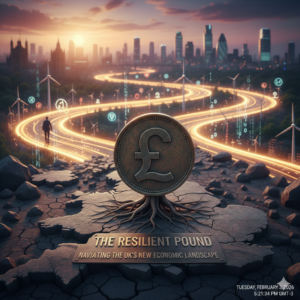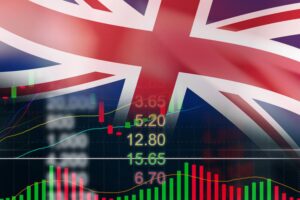
Balance Your Money and Your Life in the UK
The decision about whether to start investing or pay off credit card debt first is one of those financial conundrums you often have to make—especially in the UK, where the cost of living is essentially through the roof, interest rates vary and personal finance education is often ignored. And while investing grows wealth for the future, credit card debt can slowly eat away at your financial momentum with glaring interest charges.
So, what’s the smartest move? In this guide, we’ll break down the pros and cons of each move, how to determine which works best for you, and when you can theoretically achieve both goals at once.

💳 What credit card debt is really costing the UK
Before we get into investing, I want to be sure you realize how destructive credit card debt can be.
The average APR (Annual Percentage Rate) for credit cards in the UK in 2025 is 20%–35%, this will vary depending of the provider, and on your credit score. That means if you owe £2,000 and make minimum repayments, you may find yourself paying hundreds – or (potentially) thousands — more in interest over time.
Let’s break that down:
Balance | APR | Time to Pay Off (Min. Payments) | Total Interest Paid |
|---|---|---|---|
£2,000 | 25% | 18+ years | Over £3,000 |
📌 Your investments might yield 5–10% a year, but if your credit card interest rate is 25%, you’re essentially losing money unless you pay off your debt first.
📈 What About the Benefits of Investing?
The alternative is investing, the way your money grows through the magic of compound returns. Historically, UK equity investments (like the ftse 100) have delivered 6-8% per year over the long term. If you’re young — or planning for retirement — the math that comes from early investing is potent.
Key Advantages:
- Compound growth over time
- Helps beat inflation
- Generates Secure Long-Term Wealth.
- Dividends and capital appreciation opportunity
But here’s the key comparison:
Strategy | Average Annual Rate |
|---|---|
Credit Card Interest | 20–35% (you pay) |
Long-Term Investment Return | 5–8% (you earn) |
Yes, it’s obvious that paying off credit card debt has a better “return” than investing in most cases.
🧠 Factors to Consider Before Making a Decision
Here’s what you need to ask yourself:
- What is the interest rate on your debt?
If over 15 per cent, pay down if these are your debts. Investing may make sense if it’s a 0% promo rate (i.e. a balance transfer card).
- Do you have an emergency savings?
And you should have £500-£1,000 saved up before investing. Otherwise, emergencies might as well make you have to rely on credit again.
- Are you paying minimum payments or higher?
Only paying the minimum? Then your debt is growing. Just make sure to pay it off first.
- Are your finances stable?
If you have a stable income and you don’t pay very much money on overhead and if that is sustainable, you are in a better position to invest + handle the debt.
🧮 Real Life Example: Sarah Manchester.
Sarah has:
£3,000 in credit card debt at 23% APR
£500 in savings
£300/month disposable income
If she puts £300 into investments, she might earn ~£24/year (assuming 8% returns).
If she uses it to pay off her debt, she saves ~£690/year in interest.
🟰 Can You Do Both At Once?
Yes—if your situation allows. If both are worked at the same time a hybrid approach really can work:
- You can handle your debt (a reasonable interest rate under 10% APR or a 0% intro offer)
- You do have a little bit to cover emergencies in savings
- You’re hoping to establish good investing habits but not ignoring the debt
The 70/30 Rule:
For 70 percent of your disposable income, use it to aggressively pay down your debt.
Invest the other 30% (in a low-risk product, such as a Stocks & Shares ISA)
That way, you’re getting better on two fronts, confidence and consistency.
📱 Employ Tools That Can Help You Keep a Balance
There is no shortage of apps and services based in the UK to help you along:
- Moneybox -Save and Invest Money with Round-Ups from Purchases
- Emma – It connects all your bank and credit card accounts and help you visualise your debts.
- Monzo Pots: Evenly divi your pay into spend, debt and invest pots
- MoneyHelper (UK Govt) – Free debt and budget advice and tools
✅ When Should You Invest Rather Than Pay Off Debt?
There are a few situations where saving may take precedence, even if you have a balance on a credit card:
- 0% Balance Transfer Cards:
So if your debt is interest-free for 12–24 months, it may make sense to invest some of your income — as long as you’re making monthly payments and have it paid off before the promo ends.
- Employer Pension Matching:
If your employer offers matching pension contributions (as is typical in the U.K.), you will want to put in the full matching amount. It’s essentially free money.
- Low-Interest Debt:
If your credit card APR is under 10% and you’re pretty sure about your stable financial condition, some investment opportunities will result in a greater ROI in the long term.
❗ Mistakes to Avoid
- Obliterating debt in favor of high returns
- Investing borrowed funds (such as with credit cards)
- Forgetting to review fees on investment platforms
- halting contributions and only investing
- Skipping emergency savings
And remember, it should be about balance and progress, not perfection.
🏁 Final Thoughts: A Smarter First Step is Debt Pay-Off
In general, and particularly for high-interest credit cards, paying off debt trumps investing when it comes to the best financial decisions. The “return” on repaying debt is, mathematically and emotionally, often greater than you’d get from super-beginner-friendly investments.
But when it comes to personal finance, personal is the key word. “If you have low-interest debt, or are in a 0% promotional period, there may be some opportunities to start investing while responsibly managing balances,’ If you make money decisions based on your life goals and values, and not just maximizing dollars, you often will have a more intentional, lasting approach. What’s most important is to have a good plan, achieve a targets and to be consistent.
Your cash flow increases as you pay down your debts. Once you are out of debt, you will be able to invest with a sense of freedom and confidence unlike any other — without the overhanging cloud of financial stress and guilt.
The greatest return might simply be to repay yourself first.
Our Post


The Resilient Pound: Navigating the UK’s New Economic Landscape


